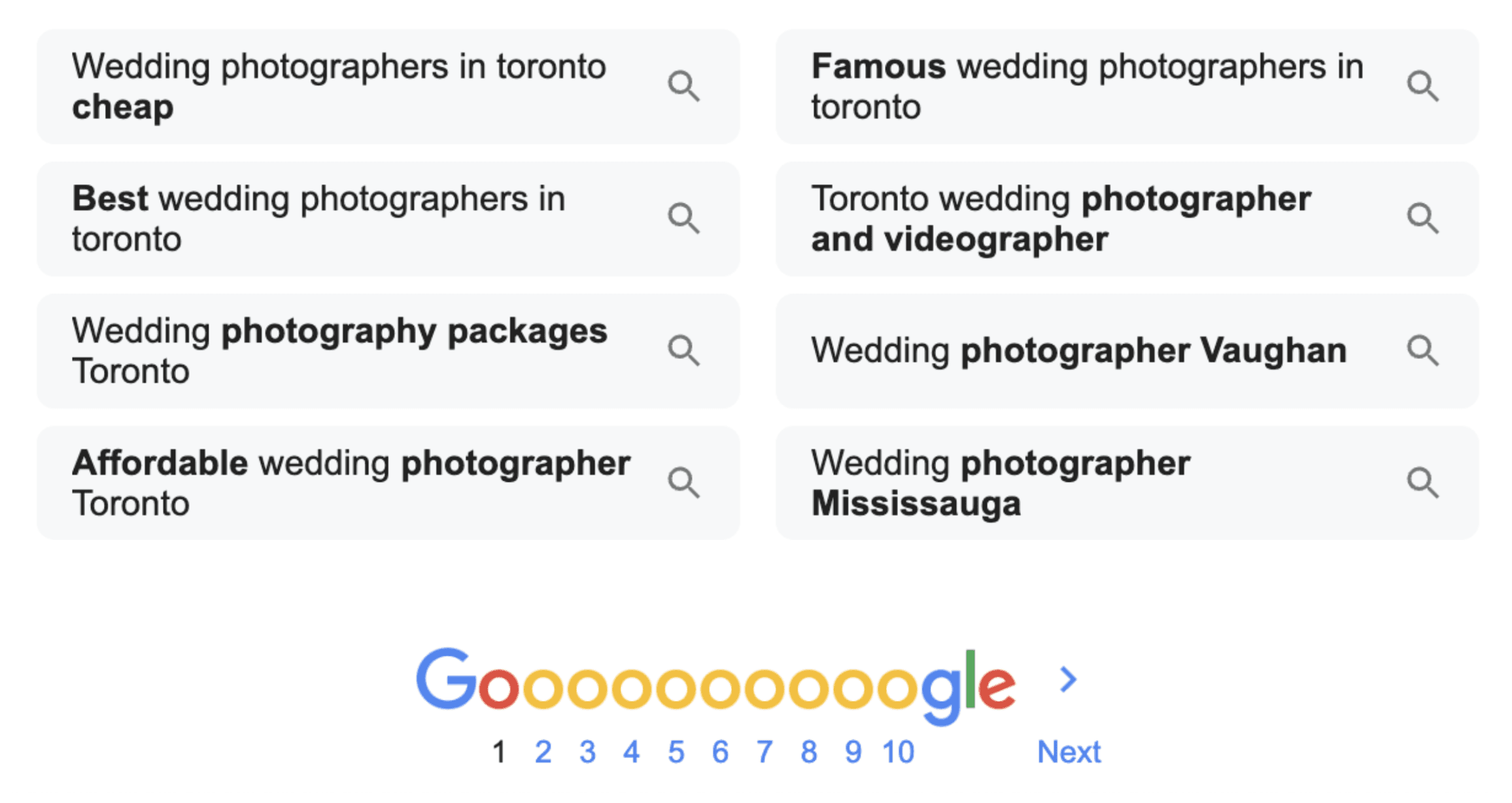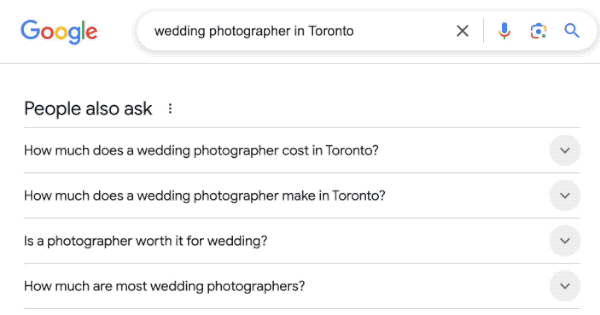Content Marketing
SEO Keywords For Photographers: Free List (2024)
SEO Keywords For Photographers: Free List (2024)
SEO Keywords For Photographers: Free List (2024)
SEO Keywords For Photographers: Free List (2024)
Here's a list of the best SEO keywords for photographers and how to use them to attract more leads for your photography business.
Here's a list of the best SEO keywords for photographers and how to use them to attract more leads for your photography business.
When you’re passionate about creating, it’s easy to get lost in your art and forget about marketing your business. Photographers and creative professionals are a perfect example of this. Though it may feel like a secondary (or annoying) concern, promoting your services will help you stand out in a crowded market and grow your client base.
For photographers, Search Engine Optimization (SEO) helps your website appear at the top of search results, connecting you with people who are already interested in what you offer. Following SEO best practices can make the difference between being discovered by a few people or showing up to hundreds (or thousands) of potential clients.
In this blog post, we’ll share a free list of the best SEO keywords for photographers and how to use them to attract more leads for your photography business.
Table of Contents
Why are keywords important in SEO?
SEO Keywords For Photographers
Location-based keywords
Niche-specific keywords
Question keywords
SEO Tips For Photographers
Why are Keywords Important In SEO?
Using relevant keywords bridges the gap between what people are looking for (search intent) and the services that you offer. Having a stunning portfolio on your website is a great start, but it doesn’t guarantee that your work will be seen by your target audience.
For example, imagine a couple in Toronto looking for a photographer for their wedding, and you want them to visit your site. If you’re using the keyword “wedding photographer in Toronto,” you're more likely to show up at the top of the search results compared to using something more general like “Toronto photographer.”
Why does this matter? Because data shows that most people don’t look beyond the first few results. In fact, 54.4% of all clicks go to the Top 3 results, and only 0.63% click on items in the second page, according to a study by Backlinko.
The goal is to get as high as possible on the first page of Google for keywords in your niche and drive more traffic to your website.
Finding the Right Keywords
For photographers, this means selecting keywords that reflect your services and have a good balance between search volume and difficulty. Here’s what they mean:
Search Volume (SV) - The number of times that people search for a keyword within a month.
Keyword Difficulty (KD) - How competitive a keyword is, measured on a scale of 0 to 100. Lower difficulty means it’s easier to rank for.
High-volume keywords tend to have higher difficulty as well because more sites are competing for a share. They often look like highly broad terms (“t-shirt”) or highly valuable terms (“business loans”).
Try to find a balance—opt for keywords with decent search volume but lower difficulty to increase your chances of ranking on the first page. You can use both free and paid tools like Google Trends, Ahrefs, and Semrush to check these metrics. Or, you can use our free list below where we’ve already done some of the legwork!
SEO Keywords For Photographers
We've put together a free photography keywords list to get you started with SEO and increase the visibility of your website.
Location-Based Keywords
[Area] photographer - Ex. “Vancouver photographer”
photographer in [area] - Ex. “photographer in Montreal”
photography studio in [area] - Ex. “photography studio in Ottawa”
[specialty] photographer in [area] - Ex. “commercial photographer in Toronto”
By adding your location, search engines can match your site with local searches. This makes it easier for people nearby to find and book your services. We recommend adding these keywords to your homepage and service pages to help attract local customers.
Niche-Specific Keywords
Consider the specific photography niche that you specialize in and think about what your potential clients are searching for. For example, wedding photographers might want to target keywords like “how to pose for engagement photos” and “fun wedding photo ideas.”
Here are some examples for different types of photography:
Event Photography:
“corporate event photography rates”
“photographer for birthday party”
Family Photography:
“family photography poses”
“maternity photoshoot ideas”
“family photography with newborn”
Pet Photography:
“pet portraits in [area]”
“christmas pet photography”
Commercial Photography:
“advertising photography”
“amazon product photography service”
These keywords help attract clients who are searching for specific services. To find more ideas, check the bottom of Google’s search results page to see related keywords that you can add to your list.
While a broad term like “wedding photographer” may be tough to rank for if you’re just starting out, a long-tail keyword like “affordable wedding photographer in [area]” will give you a better shot at showing up in relevant searches.

Question Keywords
If you’ve worked with similar clients in the past, note down any recurring concerns or inquiries they’ve shared with you. For instance, if you specialize in real estate photography, a common question might be: “What’s the best time of day for real estate photos?”
You can also find question keywords in “People Also Ask” on the first page of Google search results. Including these in your blog posts or FAQs not only answers your clients’ needs but also increases the chances of your page being featured in this section.

SEO Tips For Photographers
Once you’ve gathered a list of keywords, the next step is to incorporate them strategically throughout your website. If you’re just starting out, you may be wondering what it even means to “use a keyword”, so we’ve broken it down into a few different actionable areas.
Assign a Unique Keyword to Each Page
Every page on your site should focus on a single main keyword to avoid competing with other pages. If you target the same keyword on two or more pages, search traffic will split among them instead of going to a single dedicated page, potentially lowering your ranking.
Align Pages With Search Intent
Search intent refers to the reason why the user is searching for that keyword. To attract the right audience, your content should match the purpose of their search, whether they’re looking for information, services, or making a purchase.
For example, if someone searches "best locations for outdoor photoshoots near me," they’re looking for ideas, not necessarily booking a photographer. But if they search "portrait photographer in Vancouver," they're likely ready to hire.
Here’s what you can do: For the first keyword, create a blog post listing outdoor locations and include photos you’ve taken there, if any. The second keyword has commercial intent, so you can add it to your homepage and make it easy to find booking details, pricing, and contact information. Streamlining the user experience–even for non-commercial searches–increases the likelihood they’ll follow through and contact you!
Avoid Keyword Stuffing
Add the main keyword to the page URL, title, alt text, and meta description, but don’t overload the content with it. This is considered keyword stuffing and it can hurt your rankings. Instead, ensure that keywords blend well with your text and use variations that make sense.
❌ Bad example: "Looking for a portrait photographer? Book a portrait photography session with our portrait photographer today for the best portrait photography in Toronto."
✅ Good example: "Looking for a portrait photographer in Toronto? Our portrait sessions focus on highlighting your unique style and personality. Book with us today."
By using keywords naturally, you can maintain readability while still optimizing for SEO. The human that will be reading your content should always come first!
Adding the right SEO keywords to your photography website is an effective way to reach people who are genuinely interested in what you offer. It’s true that implementing SEO takes time and effort, but with consistency, it will pay off in the form of increased search traffic and leads for your business.
When you’re passionate about creating, it’s easy to get lost in your art and forget about marketing your business. Photographers and creative professionals are a perfect example of this. Though it may feel like a secondary (or annoying) concern, promoting your services will help you stand out in a crowded market and grow your client base.
For photographers, Search Engine Optimization (SEO) helps your website appear at the top of search results, connecting you with people who are already interested in what you offer. Following SEO best practices can make the difference between being discovered by a few people or showing up to hundreds (or thousands) of potential clients.
In this blog post, we’ll share a free list of the best SEO keywords for photographers and how to use them to attract more leads for your photography business.
Table of Contents
Why are keywords important in SEO?
SEO Keywords For Photographers
Location-based keywords
Niche-specific keywords
Question keywords
SEO Tips For Photographers
Why are Keywords Important In SEO?
Using relevant keywords bridges the gap between what people are looking for (search intent) and the services that you offer. Having a stunning portfolio on your website is a great start, but it doesn’t guarantee that your work will be seen by your target audience.
For example, imagine a couple in Toronto looking for a photographer for their wedding, and you want them to visit your site. If you’re using the keyword “wedding photographer in Toronto,” you're more likely to show up at the top of the search results compared to using something more general like “Toronto photographer.”
Why does this matter? Because data shows that most people don’t look beyond the first few results. In fact, 54.4% of all clicks go to the Top 3 results, and only 0.63% click on items in the second page, according to a study by Backlinko.
The goal is to get as high as possible on the first page of Google for keywords in your niche and drive more traffic to your website.
Finding the Right Keywords
For photographers, this means selecting keywords that reflect your services and have a good balance between search volume and difficulty. Here’s what they mean:
Search Volume (SV) - The number of times that people search for a keyword within a month.
Keyword Difficulty (KD) - How competitive a keyword is, measured on a scale of 0 to 100. Lower difficulty means it’s easier to rank for.
High-volume keywords tend to have higher difficulty as well because more sites are competing for a share. They often look like highly broad terms (“t-shirt”) or highly valuable terms (“business loans”).
Try to find a balance—opt for keywords with decent search volume but lower difficulty to increase your chances of ranking on the first page. You can use both free and paid tools like Google Trends, Ahrefs, and Semrush to check these metrics. Or, you can use our free list below where we’ve already done some of the legwork!
SEO Keywords For Photographers
We've put together a free photography keywords list to get you started with SEO and increase the visibility of your website.
Location-Based Keywords
[Area] photographer - Ex. “Vancouver photographer”
photographer in [area] - Ex. “photographer in Montreal”
photography studio in [area] - Ex. “photography studio in Ottawa”
[specialty] photographer in [area] - Ex. “commercial photographer in Toronto”
By adding your location, search engines can match your site with local searches. This makes it easier for people nearby to find and book your services. We recommend adding these keywords to your homepage and service pages to help attract local customers.
Niche-Specific Keywords
Consider the specific photography niche that you specialize in and think about what your potential clients are searching for. For example, wedding photographers might want to target keywords like “how to pose for engagement photos” and “fun wedding photo ideas.”
Here are some examples for different types of photography:
Event Photography:
“corporate event photography rates”
“photographer for birthday party”
Family Photography:
“family photography poses”
“maternity photoshoot ideas”
“family photography with newborn”
Pet Photography:
“pet portraits in [area]”
“christmas pet photography”
Commercial Photography:
“advertising photography”
“amazon product photography service”
These keywords help attract clients who are searching for specific services. To find more ideas, check the bottom of Google’s search results page to see related keywords that you can add to your list.
While a broad term like “wedding photographer” may be tough to rank for if you’re just starting out, a long-tail keyword like “affordable wedding photographer in [area]” will give you a better shot at showing up in relevant searches.

Question Keywords
If you’ve worked with similar clients in the past, note down any recurring concerns or inquiries they’ve shared with you. For instance, if you specialize in real estate photography, a common question might be: “What’s the best time of day for real estate photos?”
You can also find question keywords in “People Also Ask” on the first page of Google search results. Including these in your blog posts or FAQs not only answers your clients’ needs but also increases the chances of your page being featured in this section.

SEO Tips For Photographers
Once you’ve gathered a list of keywords, the next step is to incorporate them strategically throughout your website. If you’re just starting out, you may be wondering what it even means to “use a keyword”, so we’ve broken it down into a few different actionable areas.
Assign a Unique Keyword to Each Page
Every page on your site should focus on a single main keyword to avoid competing with other pages. If you target the same keyword on two or more pages, search traffic will split among them instead of going to a single dedicated page, potentially lowering your ranking.
Align Pages With Search Intent
Search intent refers to the reason why the user is searching for that keyword. To attract the right audience, your content should match the purpose of their search, whether they’re looking for information, services, or making a purchase.
For example, if someone searches "best locations for outdoor photoshoots near me," they’re looking for ideas, not necessarily booking a photographer. But if they search "portrait photographer in Vancouver," they're likely ready to hire.
Here’s what you can do: For the first keyword, create a blog post listing outdoor locations and include photos you’ve taken there, if any. The second keyword has commercial intent, so you can add it to your homepage and make it easy to find booking details, pricing, and contact information. Streamlining the user experience–even for non-commercial searches–increases the likelihood they’ll follow through and contact you!
Avoid Keyword Stuffing
Add the main keyword to the page URL, title, alt text, and meta description, but don’t overload the content with it. This is considered keyword stuffing and it can hurt your rankings. Instead, ensure that keywords blend well with your text and use variations that make sense.
❌ Bad example: "Looking for a portrait photographer? Book a portrait photography session with our portrait photographer today for the best portrait photography in Toronto."
✅ Good example: "Looking for a portrait photographer in Toronto? Our portrait sessions focus on highlighting your unique style and personality. Book with us today."
By using keywords naturally, you can maintain readability while still optimizing for SEO. The human that will be reading your content should always come first!
Adding the right SEO keywords to your photography website is an effective way to reach people who are genuinely interested in what you offer. It’s true that implementing SEO takes time and effort, but with consistency, it will pay off in the form of increased search traffic and leads for your business.
When you’re passionate about creating, it’s easy to get lost in your art and forget about marketing your business. Photographers and creative professionals are a perfect example of this. Though it may feel like a secondary (or annoying) concern, promoting your services will help you stand out in a crowded market and grow your client base.
For photographers, Search Engine Optimization (SEO) helps your website appear at the top of search results, connecting you with people who are already interested in what you offer. Following SEO best practices can make the difference between being discovered by a few people or showing up to hundreds (or thousands) of potential clients.
In this blog post, we’ll share a free list of the best SEO keywords for photographers and how to use them to attract more leads for your photography business.
Table of Contents
Why are keywords important in SEO?
SEO Keywords For Photographers
Location-based keywords
Niche-specific keywords
Question keywords
SEO Tips For Photographers
Why are Keywords Important In SEO?
Using relevant keywords bridges the gap between what people are looking for (search intent) and the services that you offer. Having a stunning portfolio on your website is a great start, but it doesn’t guarantee that your work will be seen by your target audience.
For example, imagine a couple in Toronto looking for a photographer for their wedding, and you want them to visit your site. If you’re using the keyword “wedding photographer in Toronto,” you're more likely to show up at the top of the search results compared to using something more general like “Toronto photographer.”
Why does this matter? Because data shows that most people don’t look beyond the first few results. In fact, 54.4% of all clicks go to the Top 3 results, and only 0.63% click on items in the second page, according to a study by Backlinko.
The goal is to get as high as possible on the first page of Google for keywords in your niche and drive more traffic to your website.
Finding the Right Keywords
For photographers, this means selecting keywords that reflect your services and have a good balance between search volume and difficulty. Here’s what they mean:
Search Volume (SV) - The number of times that people search for a keyword within a month.
Keyword Difficulty (KD) - How competitive a keyword is, measured on a scale of 0 to 100. Lower difficulty means it’s easier to rank for.
High-volume keywords tend to have higher difficulty as well because more sites are competing for a share. They often look like highly broad terms (“t-shirt”) or highly valuable terms (“business loans”).
Try to find a balance—opt for keywords with decent search volume but lower difficulty to increase your chances of ranking on the first page. You can use both free and paid tools like Google Trends, Ahrefs, and Semrush to check these metrics. Or, you can use our free list below where we’ve already done some of the legwork!
SEO Keywords For Photographers
We've put together a free photography keywords list to get you started with SEO and increase the visibility of your website.
Location-Based Keywords
[Area] photographer - Ex. “Vancouver photographer”
photographer in [area] - Ex. “photographer in Montreal”
photography studio in [area] - Ex. “photography studio in Ottawa”
[specialty] photographer in [area] - Ex. “commercial photographer in Toronto”
By adding your location, search engines can match your site with local searches. This makes it easier for people nearby to find and book your services. We recommend adding these keywords to your homepage and service pages to help attract local customers.
Niche-Specific Keywords
Consider the specific photography niche that you specialize in and think about what your potential clients are searching for. For example, wedding photographers might want to target keywords like “how to pose for engagement photos” and “fun wedding photo ideas.”
Here are some examples for different types of photography:
Event Photography:
“corporate event photography rates”
“photographer for birthday party”
Family Photography:
“family photography poses”
“maternity photoshoot ideas”
“family photography with newborn”
Pet Photography:
“pet portraits in [area]”
“christmas pet photography”
Commercial Photography:
“advertising photography”
“amazon product photography service”
These keywords help attract clients who are searching for specific services. To find more ideas, check the bottom of Google’s search results page to see related keywords that you can add to your list.
While a broad term like “wedding photographer” may be tough to rank for if you’re just starting out, a long-tail keyword like “affordable wedding photographer in [area]” will give you a better shot at showing up in relevant searches.

Question Keywords
If you’ve worked with similar clients in the past, note down any recurring concerns or inquiries they’ve shared with you. For instance, if you specialize in real estate photography, a common question might be: “What’s the best time of day for real estate photos?”
You can also find question keywords in “People Also Ask” on the first page of Google search results. Including these in your blog posts or FAQs not only answers your clients’ needs but also increases the chances of your page being featured in this section.

SEO Tips For Photographers
Once you’ve gathered a list of keywords, the next step is to incorporate them strategically throughout your website. If you’re just starting out, you may be wondering what it even means to “use a keyword”, so we’ve broken it down into a few different actionable areas.
Assign a Unique Keyword to Each Page
Every page on your site should focus on a single main keyword to avoid competing with other pages. If you target the same keyword on two or more pages, search traffic will split among them instead of going to a single dedicated page, potentially lowering your ranking.
Align Pages With Search Intent
Search intent refers to the reason why the user is searching for that keyword. To attract the right audience, your content should match the purpose of their search, whether they’re looking for information, services, or making a purchase.
For example, if someone searches "best locations for outdoor photoshoots near me," they’re looking for ideas, not necessarily booking a photographer. But if they search "portrait photographer in Vancouver," they're likely ready to hire.
Here’s what you can do: For the first keyword, create a blog post listing outdoor locations and include photos you’ve taken there, if any. The second keyword has commercial intent, so you can add it to your homepage and make it easy to find booking details, pricing, and contact information. Streamlining the user experience–even for non-commercial searches–increases the likelihood they’ll follow through and contact you!
Avoid Keyword Stuffing
Add the main keyword to the page URL, title, alt text, and meta description, but don’t overload the content with it. This is considered keyword stuffing and it can hurt your rankings. Instead, ensure that keywords blend well with your text and use variations that make sense.
❌ Bad example: "Looking for a portrait photographer? Book a portrait photography session with our portrait photographer today for the best portrait photography in Toronto."
✅ Good example: "Looking for a portrait photographer in Toronto? Our portrait sessions focus on highlighting your unique style and personality. Book with us today."
By using keywords naturally, you can maintain readability while still optimizing for SEO. The human that will be reading your content should always come first!
Adding the right SEO keywords to your photography website is an effective way to reach people who are genuinely interested in what you offer. It’s true that implementing SEO takes time and effort, but with consistency, it will pay off in the form of increased search traffic and leads for your business.


